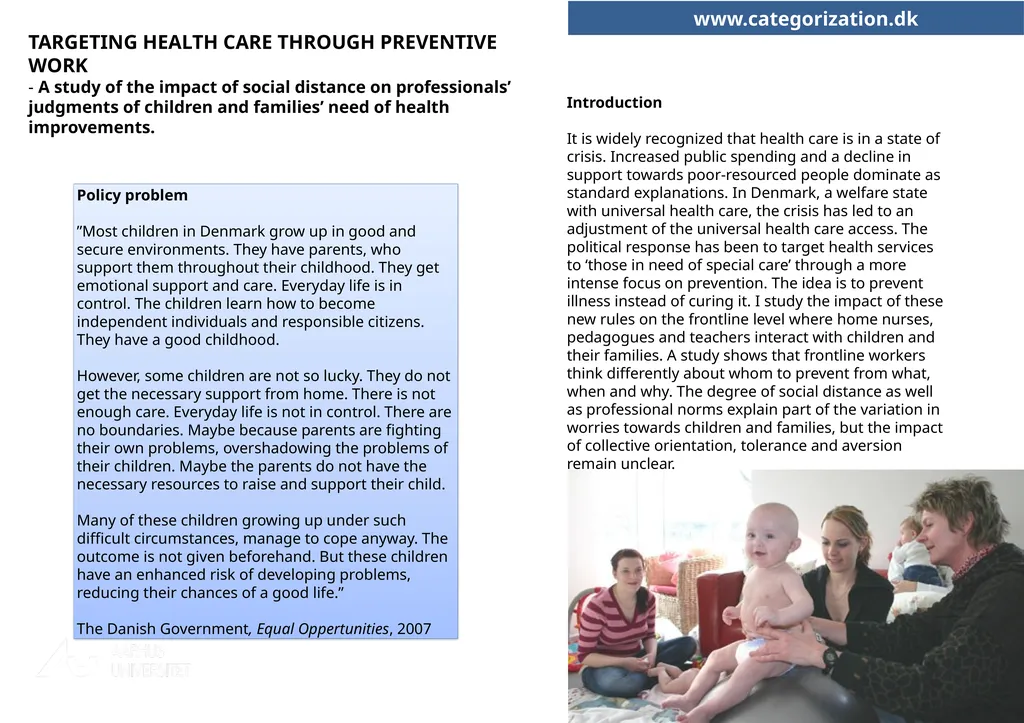Marie Østergaard Møller Associate Professor, PhD.
Author : conchita-marotz | Published Date : 2025-05-12
Description: Marie Østergaard Møller Associate Professor PhD TARGETING HEALTH CARE THROUGH PREVENTIVE WORK A study of the impact of social distance on professionals judgments of children and families need of health improvements Introduction It is
Presentation Embed Code
Download Presentation
Download
Presentation The PPT/PDF document
"Marie Østergaard Møller Associate Professor, PhD." is the property of its rightful owner.
Permission is granted to download and print the materials on this website for personal, non-commercial use only,
and to display it on your personal computer provided you do not modify the materials and that you retain all
copyright notices contained in the materials. By downloading content from our website, you accept the terms of
this agreement.
Transcript:Marie Østergaard Møller Associate Professor, PhD.:
Marie Østergaard Møller Associate Professor, PhD. TARGETING HEALTH CARE THROUGH PREVENTIVE WORK - A study of the impact of social distance on professionals’ judgments of children and families’ need of health improvements. Introduction It is widely recognized that health care is in a state of crisis. Increased public spending and a decline in support towards poor-resourced people dominate as standard explanations. In Denmark, a welfare state with universal health care, the crisis has led to an adjustment of the universal health care access. The political response has been to target health services to ‘those in need of special care’ through a more intense focus on prevention. The idea is to prevent illness instead of curing it. I study the impact of these new rules on the frontline level where home nurses, pedagogues and teachers interact with children and their families. A study shows that frontline workers think differently about whom to prevent from what, when and why. The degree of social distance as well as professional norms explain part of the variation in worries towards children and families, but the impact of collective orientation, tolerance and aversion remain unclear. Policy problem ”Most children in Denmark grow up in good and secure environments. They have parents, who support them throughout their childhood. They get emotional support and care. Everyday life is in control. The children learn how to become independent individuals and responsible citizens. They have a good childhood. However, some children are not so lucky. They do not get the necessary support from home. There is not enough care. Everyday life is not in control. There are no boundaries. Maybe because parents are fighting their own problems, overshadowing the problems of their children. Maybe the parents do not have the necessary resources to raise and support their child. Many of these children growing up under such difficult circumstances, manage to cope anyway. The outcome is not given beforehand. But these children have an enhanced risk of developing problems, reducing their chances of a good life.” The Danish Government, Equal Oppertunities, 2007 www.categorization.dk Marie Østergaard Møller Associate Professor, PhD. Theoretical approach: Professionals’ judgments are based on different sources of criteria for judging such as formal rules (health Law), doxa (shared organizational knowledge), policy preferences, normality perceptions, professional knowledge (skills and professional identity) and habitus. Data and design: Interviews with 58 Danish home nurses, pedagogues and teachers who interact with children in
Download Document
Here is the link to download the presentation.
"Marie Østergaard Møller Associate Professor, PhD."The content belongs to its owner. You may download and print it for personal use, without modification, and keep all copyright notices. By downloading, you agree to these terms.
Related Presentations

Page of Analysis of Cancer Incidence Data in Coldwater Creek Area Missouri Shumei Yun

Newly Tenured Associate Professors

Marie and Pierre Curie

Key Visuals and Quotes Supporting Marie Clay’s Complex Li

Issue #22, October Edition By: Marie Sirenko

JournalofAthleticTraining2015;50(2):217

Marie Curie

Associate Professor to Professor

Can SMEs survive climate change? Eva Marie Arts and Crafts versus Typhoon Yolanda

Chapter 4 MARIE: An Introduction

Paul B. Manis, PhD (2018

Fourierism Charles Fourier (Francois-Marie-Charles Fourier)

19/12/2017 CHU Marie Curie, Lodelinsart

Business 2.0 Abdul Al Lily, PhD (Oxford), Associate Prof., King Faisal Uni., allili55@hotmail.com














